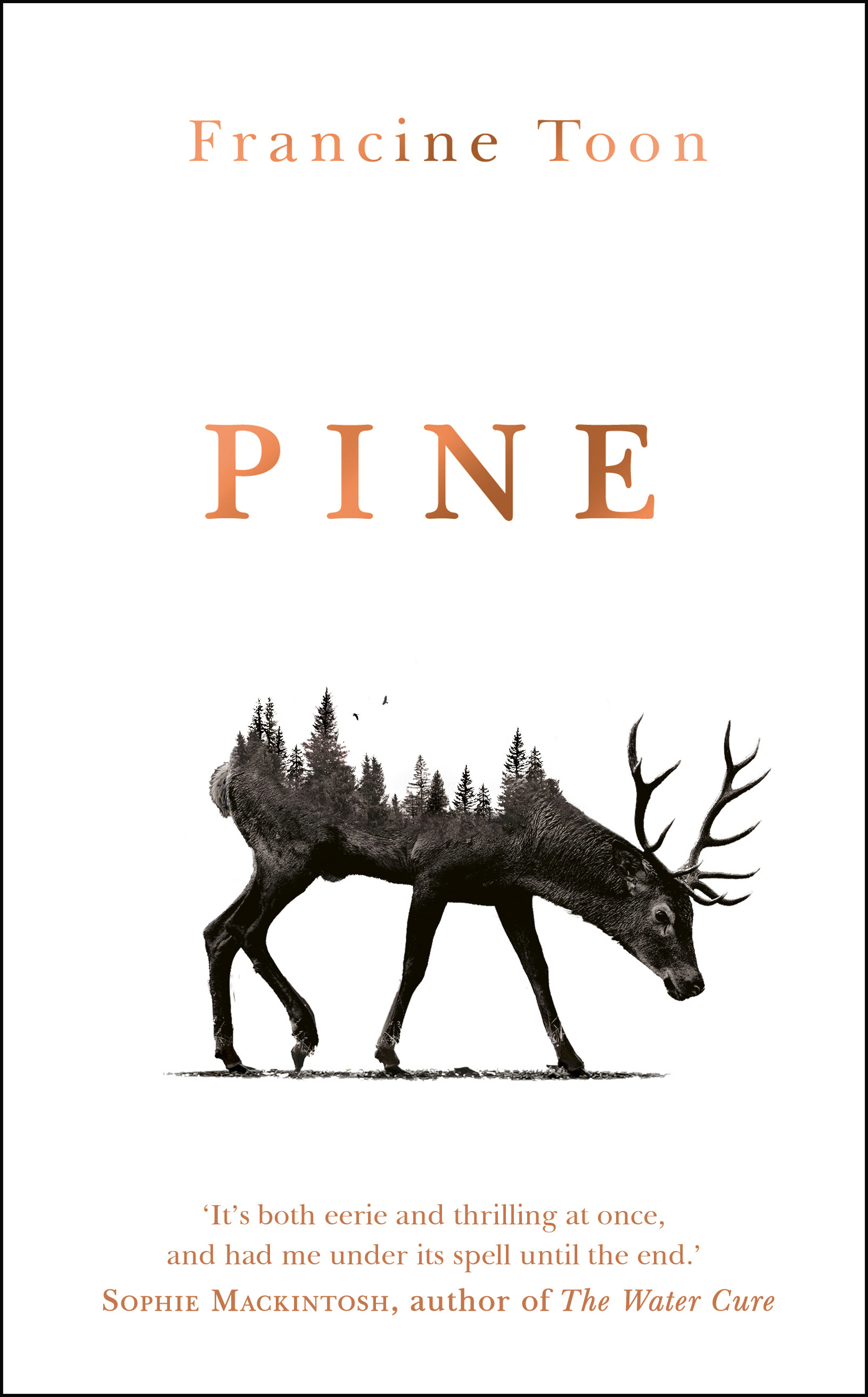Francine Toon: Pine review – trauma and terror in the Highlands | reviews, news & interviews
Francine Toon: Pine review – trauma and terror in the Highlands
Francine Toon: Pine review – trauma and terror in the Highlands
A skilful renewal of Scottish Gothic fiction

Supernatural and Gothic stories have always haunted the misty borderlands between high and popular culture. The finest manage to hover between page-turning genre tales and what counts as respectable or “literary” fiction. This place in a perpetual limbo can offer the authors of yarns about borderline beings and in-between states an exhilarating kind of freedom.
In Britain, the most recent wave of neo-Gothic writing has tended to flourish around the scruffy, neglected edgelands of these isles: in the superstition-ridden rural northern England evoked by Jenn Ashworth or Andrew Michael Hurley, for example. Scotland, of course, has its own deep vein of eldritch story-telling that, in its literary guise, stretches from pioneers such as James Hogg and RL Stevenson to Naomi Mitchison and beyond. Pine, Francine Toon’s cleverly titled debut novel, nods gently but not obtrusively towards this supernatural hinterland while telling a contemporary tale of trauma and bereavement that drifts at its darkest corners into paranormal terror. MR James thought that the classic ghost story needed some “loophole of a natural explanation”, and I’m not sure Toon makes hers quite wide enough to satisfy the most doggedly sceptical of readers. Still, we leave Pine in no doubt that “the horror and the cruelty” of this plot stems mostly from the wholly human anguish and loss that she brings skilfully, and movingly, to light.
We view the action largely from the perspective of Lauren, a ten-year-old girl who lives with her single father Niall on the edge of a remote forest in the Scottish Highlands. Christine, her mother, vanished during Lauren’s infancy. Niall, a solitary handyman and fixer-upper who can’t mend his own shattered spirit, drinks, broods, plays guitar in ceilidh bands, and attacks his work and life with a veiled rage that makes his daughter notice “the tiny margin of difference between anger and irony”. Sometimes, the semi-feral Niall can feel “as though he was turning into a werewolf”. The absence of Christine – a fey-sounding New Age healer whose outsider status means that the word “witch”, in jest or not, clings to her memory – clouds their lives like the haar that cloaks the woods. The story begins, though, at Halloween, with the local kids’ jokey vampire lipstick, spooky costumes, and even impromptu renditions of Meat Loaf’s “Bat Out of Hell”. Toon borrows a time-honoured Gothic ploy – begin with larks and mockery, then make the comic horror come true.
The authentic shock here takes the shape of a pallid young woman in a white dressing-gown who looms into Niall’s headlamps, an apparition “whose face looks so young but whose expression is old”. She pays father and daughter more than one visit; both see her, as does an eccentric neighbour, as she surfaces “like a nocturnal animal that has come out of its den”. But the adults refuse to talk about this forlorn, suffering figure. Lauren, meanwhile, goes about the business of any schoolgirl in a far-flung and gossip-ridden spot. Toon builds up a plausible picture of self-sufficient, multi-tasking but rumour-prone Highland life. Suspicions buzz around Christine’s disappearance, Niall’s role in the mystery and Lauren’s supposed oddity; she’s the kind of vulnerable scapegoat who “hears about birthday parties the day after they happen”.
 Near the forest that represents the “wild inverse” to man-made space, father and daughter dwell in, and on, their shared loneliness. Lauren tries to learn more about the lost Christine. Toon doesn’t overdo the supernatural folklore of the region and its eerie creatures – seal-shaped selkies, horse-like kelpies and so forth – but it lurks consistently in the background. Lauren’s fascination with Tarot readings and the magic of the traditional Scottish “spaewife” (fortune-teller) strike more emphatic occult notes. Toon spends more time, though, on the physical and emotional landscape of this little household swathed in unnameable sorrow. Most of the bloodshed – such as the woodland rabbits trapped by Niall and then skinned “like stripping thick wallpaper” – takes strictly material forms.
Near the forest that represents the “wild inverse” to man-made space, father and daughter dwell in, and on, their shared loneliness. Lauren tries to learn more about the lost Christine. Toon doesn’t overdo the supernatural folklore of the region and its eerie creatures – seal-shaped selkies, horse-like kelpies and so forth – but it lurks consistently in the background. Lauren’s fascination with Tarot readings and the magic of the traditional Scottish “spaewife” (fortune-teller) strike more emphatic occult notes. Toon spends more time, though, on the physical and emotional landscape of this little household swathed in unnameable sorrow. Most of the bloodshed – such as the woodland rabbits trapped by Niall and then skinned “like stripping thick wallpaper” – takes strictly material forms.
Only around two-thirds of the way into Pine – a little too late, arguably – does the plot really thicken and the chills deepen. Sinister burning circles appear around a neighbour’s house. A tumbledown shack in the forest (a rather too movie-familiar device, perhaps) emerges as the focus of Lauren’s dread. Ann-Marie, a troubled older friend of Lauren’s, goes missing, while Niall’s alcoholic hazes slip into blackouts during which anything might happen. Boundaries blur, darkness gathers, and Lauren “does not know what is real any more”.
Although nifty paced, the denouement brings a touch of (perhaps inevitable) anticlimax in its wake. The bulk of the haunting in Pine, however, takes place in the over-burdened minds of father and daughter. Our journey into the “locked and secret” rooms of memory and remorse feels scary enough, whatever stance you adopt towards the novel’s occasional deployment of a seemingly supernatural machinery. Toon’s Highland settings reliably cast a misty, eerie spell that intensifies the “quiet hum of sadness” left behind by the absent (or is she?) Christine. Above all, this shadowed landscape of mourning on the brink of terror reminded me of CS Lewis’s great insight (from A Grief Observed): “No one ever told me that grief felt so like fear.”
- Pine by Francine Toon (Doubleday, £12.99)
The future of Arts Journalism
You can stop theartsdesk.com closing!
We urgently need financing to survive. Our fundraising drive has thus far raised £49,000 but we need to reach £100,000 or we will be forced to close. Please contribute here: https://gofund.me/c3f6033d
And if you can forward this information to anyone who might assist, we’d be grateful.

Subscribe to theartsdesk.com
Thank you for continuing to read our work on theartsdesk.com. For unlimited access to every article in its entirety, including our archive of more than 15,000 pieces, we're asking for £5 per month or £40 per year. We feel it's a very good deal, and hope you do too.
To take a subscription now simply click here.
And if you're looking for that extra gift for a friend or family member, why not treat them to a theartsdesk.com gift subscription?
more Books
 'We are bowled over!' Thank you for your messages of love and support
Much-appreciated words of commendation from readers and the cultural community
'We are bowled over!' Thank you for your messages of love and support
Much-appreciated words of commendation from readers and the cultural community
 Natalia Ginzburg: The City and the House review - a dying art
Dick Davis renders this analogue love-letter in polyphonic English
Natalia Ginzburg: The City and the House review - a dying art
Dick Davis renders this analogue love-letter in polyphonic English
 Tom Raworth: Cancer review - truthfulness
A 'lost' book reconfirms Raworth’s legacy as one of the great lyric poets
Tom Raworth: Cancer review - truthfulness
A 'lost' book reconfirms Raworth’s legacy as one of the great lyric poets
 Ian Leslie: John and Paul - A Love Story in Songs review - help!
Ian Leslie loses himself in amateur psychology, and fatally misreads The Beatles
Ian Leslie: John and Paul - A Love Story in Songs review - help!
Ian Leslie loses himself in amateur psychology, and fatally misreads The Beatles
 Samuel Arbesman: The Magic of Code review - the spark ages
A wide-eyed take on our digital world can’t quite dispel the dangers
Samuel Arbesman: The Magic of Code review - the spark ages
A wide-eyed take on our digital world can’t quite dispel the dangers
 Zsuzsanna Gahse: Mountainish review - seeking refuge
Notes on danger and dialogue in the shadow of the Swiss Alps
Zsuzsanna Gahse: Mountainish review - seeking refuge
Notes on danger and dialogue in the shadow of the Swiss Alps
 Patrick McGilligan: Woody Allen - A Travesty of a Mockery of a Sham review - New York stories
Fair-minded Woody Allen biography covers all bases
Patrick McGilligan: Woody Allen - A Travesty of a Mockery of a Sham review - New York stories
Fair-minded Woody Allen biography covers all bases
 Howard Amos: Russia Starts Here review - East meets West, via the Pskov region
A journalist looks beyond borders in this searching account of the Russian mind
Howard Amos: Russia Starts Here review - East meets West, via the Pskov region
A journalist looks beyond borders in this searching account of the Russian mind
 Henry Gee: The Decline and Fall of the Human Empire - Why Our Species is on the Edge of Extinction review - survival instincts
A science writer looks to the stars for a way to dodge our impending doom
Henry Gee: The Decline and Fall of the Human Empire - Why Our Species is on the Edge of Extinction review - survival instincts
A science writer looks to the stars for a way to dodge our impending doom
 Jonathan Buckley: One Boat review - a shore thing
Buckley’s 13th novel is a powerful reflection on intimacy and grief
Jonathan Buckley: One Boat review - a shore thing
Buckley’s 13th novel is a powerful reflection on intimacy and grief
 Help to give theartsdesk a future!
Support our GoFundMe appeal
Help to give theartsdesk a future!
Support our GoFundMe appeal
 Jessica Duchen: Myra Hess - National Treasure review - well-told life of a pioneering musician
Biography of the groundbreaking British pianist who was a hero of the Blitz
Jessica Duchen: Myra Hess - National Treasure review - well-told life of a pioneering musician
Biography of the groundbreaking British pianist who was a hero of the Blitz

Add comment